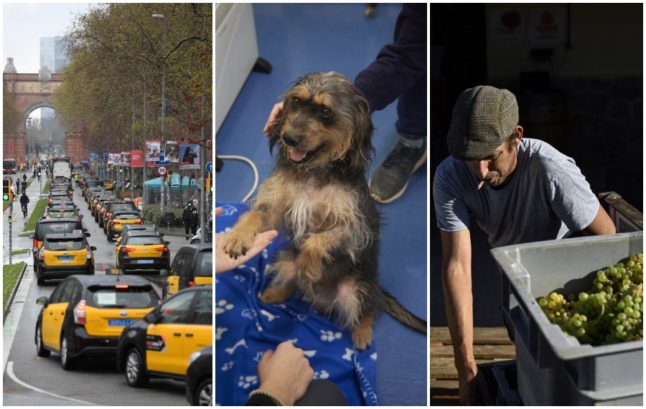Vote for a new government?
The ongoing, rather drawn out political process following Spain’s indecisive July general election will carry on into September, with centre-right Partido Popular (PP) leader Alberto Núñez Feijóo (who won the most votes in the election but lacks a majority to govern) set to have a crack at forming a government from Wednesday the 26th, with a vote the following day.
READ ALSO: Feijóo’s bid to be Spain’s PM after parliament vote is doomed – what will happen next?
Feijóo has until then to try and negotiate a governable majority with other parties, but following the Socialist (PSOE) victory in the election of Congress speaker last week, it seems unlikely the PP will have the numbers to get an absolute majority.
Another general election could loom in early 2024.
Spain’s animal welfare law comes into effect
On September 29th, Spain’s animal welfare law (‘Ley de bienestar animal‘) comes into effect. The wide ranging bill, which includes a whopping 81 different articles, enters into force partially completed because the regulations were interrupted by the July general election.
READ ALSO: UPDATE: Seven key points from Spain’s new animal welfare law
Highlights of the legislation include obliging dog owners to take out civil liability insurance and the mandatory surgical sterilisation of cats. Under the new rules, parts may not be left alone unsupervised for more than three days, or 24 hours in the case of dogs.
Rent freeze in Catalonia
The Catalan Generalitat is expected to implement a rent freeze in as many as 140 municipalities across the region in September, which between them are home to around 80 percent of the population.
Rental freezes in Spain can be implemented when an area is declared a “stressed residential market” according to Spain’s housing legislation.
New job contract conditions
September 1st is an important date for many Spanish companies and workers because a raft of important changes in labour legislation come into force that will impact on any contracts signed after that date.
These changes introduce a new system of incentives for hiring, with a special focus on permanent contracts and vulnerable groups, particularly women and the long-term unemployed, the over 45s and young people under 30.
September events and festivals in Spain
Summer may be almost over but Spain still has plenty of events and festivals you can enjoy in September, which is traditionally the month of grape harvest festivals. There are various wine exhibitions and tastings organised during the month, notably those held in Jerez and Logroño.
September is also a time when some of Spain’s most important annual festivals take place, such as the Feria de Albacete, and various historical events and re-enactments are held, such as like the Fiestas de Carthagineses y Romanos, and the Fiestas del Motín in Aranjuez.
Barcelona taxi drivers ‘slow march’
On September 5th taxi drivers from the biggest cab driver’s union in Barcelona are set to try and shut down the city centre with a slow march protest fines for boycotting Uber in the city.
Valencia market stalls up for grabs
From 6th September you can sell your products in Valencia’s markets if you decide to go for one of the 300 stalls that Valencia City Council has put up for auction.
The iconic Mercat Central has the most stalls on offer, with 84 available.
UK drivers licence swap
September also brings an important deadline for British drivers in Spain. The UK Embassy in Madrid has reminded UK driving licence holders living in Spain since before March 16th 2023 to exchange their permits for Spanish ones or they won’t be able to drive in Spain after September 16th.
In mid-March 2023, Spain’s Interior Ministry confirmed that the long-awaited post-Brexit UK-Spain driving licence deal had been approved and that those with UK licences could get back on the road while they waited to exchange it.
Regional holidays
There are no national holidays in Spain in September, but there will be a number of regional holidays across the country throughout the month.
READ ALSO: Calendar: When are Spain’s public holidays in 2023?
These include:
Diada (Catalonia Day) on September 11th.
15th September (Cantabira’s Día de La Bien Aparecida)
8th September (Asturias Day)
8th September (Extremadura Day)
2nd September (Ceuta Day)
Various island holidays in the Canary Islands:
8th September (Día de Nuestra Señora del Pino, Gran Canaria)
15th September (Día de Nuestra Señora de Los Volcanes: Lanzarote, La Graciosa and Fuerteventura)
25th September (Día de Nuestra Señora de los Reyes, El Hierro)
September weather forecast
Following an absolutely scorching summer in Spain, what does the weather forecast look like for September?
Thankfully, Spain’s state meteorological agency AEMET has predicted an overall drop in temperatures, but minimum values will continue to be quite high though generally normal temperatures are expected for the time of year.



 Please whitelist us to continue reading.
Please whitelist us to continue reading.
Member comments